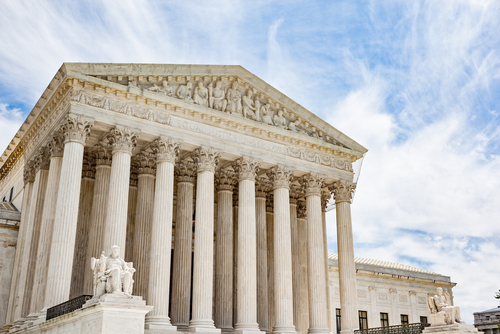
Among the mad dash of decisions to be announced on the last day of the Supreme Court’s 2016-17 session is the case of Trinity Lutheran Church of Columbia, Inc. v. Comer. Dealing directly with the Free Exercise Clause of the First Amendment, this is a case that evaluated the constitutionality of funding the improvement of a playground located at a church based preschool. This case is important because more than half of the states have prohibitions blocking public funds from going to religious organizations.
In 2012, the Trinity Lutheran Church Child Learning Center, which operates on church property, sought to participate in the the state of Missouri’s Scrap Tire Program in order to replace a large part of the playground surface. The program offers reimbursement grants to nonprofits that install playground surfaces made from recycled tires. However, Missouri had a strict policy of denying grants to any applicant owned or controlled by a church, sect, or other religious entity.
Upon application, despite the church’s high score in the application process and the fact that it fit every criteria to be funded, the program denied the church’s financial request. It explained that the Missouri Constitution, Article I, Section 7, prohibited the Department from providing money directly to a church. Both the Federal District and the Eighth Circuit Court of Appeals sided with the state, basically stating that the Department could not be compelled to disregard the Missouri Constitution.
The Supreme Court reversed the Eighth Circuit. It stated that the Department’s (state) policy violated the rights of Trinity under the Free Exercise Clause by denying the church an otherwise available public benefit solely because of its religious status. The Missouri policy lacked a state interest that would survive the strict scrutiny that the law’s effect required.
This seems to be a good ruling for several reasons. First, basic common sense. The notion that the separation of church and state should keep a playground for children which happens to be at a church from being made more safe is unreasonable. No one would question the use of public services (i.e. police or fire) to respond to a situation having to do with public safety that incidentally occurred at a church. To think otherwise would be separation of church and state “run amok.” The decision clearly contemplates preventing proliferate litigation in areas like police, fire, and health. This is a good thing.
Second, while some would worry about this case “muddying the waters” on the separation of church and state, it recognizes that there is no real “purity” in the separation issue, and certainly not so much as to allow a religious institution to be without funding for what amounts to a secular purpose (i.e., safety). Rewind to the police/fire example above. It is not clear that this decision “jeopardizes the government’s ability to remain secular,” as Justice Sotomayor states in her dissent from the bench.
More, this case is specifically limited in that it does not, as the dissent implies, open up the floodgates in public financial support for church institutions. The Court footnoted that this case does not address religious uses of funding or other forms of discrimination, but only this situation, i.e., express discrimination based on religious identity with respect to playground resurfacing.
Finally, and interestingly, there was a 7-2 ruling, which means that in the eyes of the Court, this was not such a close question that had liberals on one side, and conservatives on the other, as some issues can be.
There will be many complex situations that will continue to occur on the church/state separation question. It is the job of lawyers to “push the envelope” toward the desires of their clients, be they states or religious instructions. It is an open question how much courts at all levels will consider the “floodgates open” as to public funds going to religious institutions. Notwithstanding this, the Trinity decision does not destabilize the body of law that exists, nor will it prove to be an irresponsible decision.
[Image via Shutterstock]
This is an opinion piece. The views expressed in this article are those of just the author.